
| HOME | MENU | DOCS | SEARCH |
Humanity has known about the beneficial properties of lemon oil since ancient times: in Egypt and India, esters valued their weight in gold and were available only to members of the wealthy. Today they are sold in pharmacies and supermarkets at very reasonable prices. To properly use this tool, you need to know how to choose a quality product, how to store it and what its benefits for the body.
Oils derived from herbs, fruits and plants, man began to use even over three millennia BC. e. On the coasts of the Nile, the Indus, and even in neighboring China, lemons were grown in the Bronze Age for the production of ether. Later, the ancient Greeks and Romans learned about it. In Egypt, oils, including lemon, in their value were comparable to gold. They were used both in pure form and as a basis for hair and skin care products. Ether flavored the room and processed clothes. Valuable oils were used during religious ceremonies and added to the mixture for embalming the rulers. The Egyptians used lemon concentrate for food poisoning with meat or fish and for the treatment of typhus.
The ancient Greeks and Romans began to study in more detail the properties of various oils and found that lemon is a powerful antiseptic. Ether-based recipes have been used to treat many diseases and to treat combat wounds. Official medicine recognized the healing properties of citrus oil only at the beginning of the 18th century.
On the European continent, knowledge of the broadcast came from the Crusaders. The main producer of citrus oil was originally Italy, and now the product is mined in the entire Mediterranean coast, in California, Southeast Asia, China and Morocco.
How to choose high-quality lemon oil
There are a number of recommendations, guided by which you can choose the right natural product:
1. Read the label. It should contain the botanical name of the plant from which the oil is obtained (lemon in Latin - Cítrus límon). The packaging of foreign-made ether indicates its level of quality: Essential oil - for natural, Fragrances oil - for synthetic. The latter is better not to buy, especially for cosmetic purposes.
2. Look at the bubble. It should be glass, dark color.
3. Check the composition. Some products are a mixture of oil-base and esters. In this case, the manufacturer must indicate the percentage of both.
4. Smell the oil. The aroma should not be too sharp, bitter, without any impurities.
Organic lemon oil is suitable for skin care and aromatherapy. Avoid using synthetic or diluted esters. Do not buy lemon oil, which is obtained by distillation (evaporation), as it does not have the necessary amount of useful properties.
Storage rules
Lemon oil after opening the bottle is recommended to keep in the cold. So it retains its properties throughout the year. This also applies to esters of orange, lime, mandarin, bergamot. Other concentrates are also recommended to be stored in the refrigerator for two years. At a temperature of about +10°C, lemon oil retains its properties for six months. Esters deteriorate under the influence of air since the opening of the bottle.
Store oil in a dark place, away from direct sunlight. It is desirable that the temperature in the room was not higher than +10°C. To prevent oils from smelling other products, put the bottles in a box or a sealed container. Twist the cap of the ether container thoroughly after each use. After the first use, it is recommended to put a label on the package indicating the storage period. When it comes to an end, the oil can be poured into the aroma lamp and used for flavoring rooms, but it is better not to apply it to the skin, since the risk of allergies from using such oil increases.
You should be aware of the signs by which it can be determined that lemon ether has spoiled:
1. Look at the transparency and color of the oil. If the liquid looks cloudy, it is not recommended to use it.
2. Lemon ether loses its pronounced flavor when spoiled, may get an unpleasant smell or become sticky.
Product Types
Lemon oil is produced in two ways: by cold pressing or by distillation (distillation).
Distillation for the extraction of esters used even 5 thousand years ago. Currently this method remains the most popular. The cold pressed method is used to harvest all citrus concentrates. Initially, this was done manually: the zest was soaked to make the oil easier to separate, the liquid was collected into a sponge, and then it was squeezed out, extracting valuable esters.
The modern method of producing concentrates is less time consuming. Fruits are placed in a container with spikes, pushed and pierced them so that the oil is collected in a special tank under it. For cosmetic purposes, it is recommended to choose ether, which is extracted by pressing, since during distillation some of the useful properties of the product are lost.
The composition of lemon oil
The healing properties of lemon oil is due to its chemical composition, it includes:
• alcohols;
• esters;
• monoterpenes;
• D-limonene;
• citral;
• citronellal;
• α-pinene;
• β-pinene;
• camphene;
• β-philandrene;
• geraniol;
• terpinol;
• linalyl acetates;
• citronton;
• propyl, octyl, decyl and lauric aldehydes;
• vitamins A, B1, B2, B6, B9, B12, C, E, PP;
• potassium;
• calcium;
• zinc;
• magnesium;
• iron;
• sodium;
• phosphorus;
• manganese.
Useful properties of lemon oil
Lemon oil is one of the most valuable esters. It is used in medicine, cosmetology, perfumery, and even in the production of food.
Properties of lemon oil:
• disinfects;
• disinfects;
• destroys bacteria;
• regulates the immune system;
• fights viruses;
• lowers the temperature;
• possesses immunostimulating and anti-inflammatory properties (due to which it is used for rheumatic diseases);
• tones up;
• improves filtration processes in the kidneys (due to which it is used as a diuretic);
• fights puffiness;
• reduces gas formation;
• removes toxins from the body;
• reduces blood pressure;
• restores blood;
• fights varicose veins and cellulite;
• whitens;
• relieves pain.

Lemon oil can kill bacteria, fight viruses and fungi. This gave rise to many myths that this ether can cure almost all diseases: from herpes and shortness of breath to obesity and infection with parasites. The belief of ancient people in the healing properties of lemon oil is explicable: initially they knew little about this type of remedy, therefore false characteristics were attributed to them. Of course, even now there are those who prefer esters to traditional medicines, it is enough to recall David Stewart, the author of the book “The Chemistry of Essential Oils: Just About the Complex”. There remains a controversial question about what to prefer: official medicine or treatment with concentrates.
Doctors recognize the beneficial properties of esters, but it is worth adhering to a compromise point of view: oils are used to promote health, but for treatment of serious diseases, hospital treatment is obligatory. In this case, the use of pharmaceutical ointments and tablets can and should be combined with inhalations and baths, if there are no contraindications to the procedures.
The most popular way to use the oil is to add it to homemade cosmetics.
Face Recipes
Lemon ether exfoliates dead skin cells, gives the skin a well-groomed appearance. The product is especially useful for owners of oily skin, as the concentrate cleanses it and fights inflammation. Oil restores capillaries, eliminates corns, growths and warts.
Acne treatment
Antiseptic properties of lemon oil are used in the treatment of acne. This ether is a rich source of antioxidants and vitamin C. Due to these components, the remedy fights the causes of acne: bacteria and microbes. The substances contained in the oil regulate the production of sebum and increase the level of collagen (the protein responsible for restoring skin, its elasticity and elasticity). Thanks to this, the acne marks are smoothed out.
To treat acne, try the following recipe:
1. Add two drops of lemon ether to an empty container.
2. Pour 8-10 drops of coconut oil to it and mix.
3. Wash your face with warm water.
4. Apply the mixture to the skin and allow it to dry (this will take about 20 minutes).
5. Wash off with water.
To lighten the epidermis
Lemon oil contains citric acid, which helps to safely and carefully fight skin hyperpigmentation. Ether has anti-inflammatory and antiseptic properties. This helps to restore damaged melanin cells (pigment responsible for the color of the skin, hair and eyes). When the epidermis is too often exposed to sunlight, estrogen and progesterone are destroyed. Lemon oil penetrates the skin, helping cells regenerate and normalize acidity. So the epidermis becomes brighter, the spots disappear.
To lighten the skin is recommended to use the following recipe:
1. In a bowl, pour in two or three drops of lemon ether.
2. Add half a teaspoon of any base oil (for example, almond or grape seed).
3. Pour a tablespoon of soda into a separate container and pour a glass of warm water.
4. Stir to get a solution.
5. Wash, clean the skin in the usual way (foam or gel).
6. Gently apply the lemon mixture.
7. Let it dry (about 20-25 minutes).
8. Wash with warm water.
Since soda has a strong drying effect, it is impossible to apply the product to dry and sensitive skin. In this case, it is recommended to replace it with a double portion of the base or add lemon oil to the tonic for daily wiping.
This remedy can also be used to treat acne and acne marks.
For oily skin care
Lemon oil is a powerful tool for reducing sebum production. It has a strong astringent property, due to which the pores are narrowed, the fat content of the skin decreases, it takes on a more well-groomed appearance. To obtain this effect, use the following composition:
1. Pour a glass of clean water on a quarter.
2. Add 6–7 drops of lemon ether and 1–2 drops of jojoba oil and mix.
3. Wash your face with warm water, apply the composition (do not rub the skin, as it causes injury).
4. Leave such lotion for 7–10 minutes.
5. Rinse your face with cool water.
To prevent premature aging of the epidermis
Lemon oil contains ingredients that help protect skin cells from premature aging. They help the epidermis retain oxygen. Due to this, dull and lifeless skin becomes healthy, and wrinkles are smoothed. Lemon oil stimulates blood circulation and collagen production, restoring the epidermis naturally.
To prevent skin aging, use the following recipe:
1. Mix lemon ether with jojoba oil or olive oil (4–5 drops of concentrate is enough for a glass of the basic agent).
2. Apply the mixture on your face and leave for 10 minutes.
3. Rinse skin with water.
Pigment spots
To combat pigmentation and skin blemishes, use the following recipe:
1. 7-8 drops of lemon ether mixed with 10 ml of glycerin.
2. Apply the product to problem areas of cleaned skin with a cotton pad or cotton towel.
3. Leave the composition for 10 minutes.
4. Wash treated areas with water.
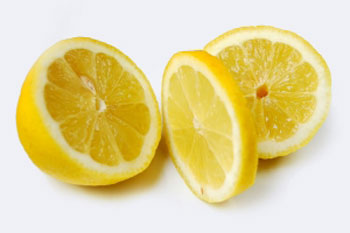
Lemon oil is also used for grinding and foot baths for the treatment of varicose veins. Such procedures relieve pain, swelling and give the feet lightness. Ether is used for wraps and massages against cellulite and stretch marks.
From cellulite
Lemon oil stimulates the lymphatic system. The body gets rid of toxins, and cellulite becomes less pronounced over time. To combat this problem, lemon concentrate is added to the base tool and used as a compress, and rubbed into the skin. For these purposes, you can apply the following mixture:
1. 3-4 drops of lemon ether are combined with 1⁄2 glasses of basic oil (for example, grape seed).
2. The composition is applied to the affected area and allowed to dry for 25 minutes.
For greater efficiency, the oil is rubbed into the skin with massage movements of the hands or a special brush for massage.
For hands, nails and cuticles
Lemon oil brightens the skin around the nails, removes yellowness and prevents their fragility. In addition, the ether gives the nail plate a natural shine and strengthens it.
We offer a simple and quick bath recipe for nail and skin care:
1. Take a bowl and pour some warm water into it.
2. Add a slice of lemon and 4–5 drops of lemon oil.
3. Dip your hands in the bath and wipe the nails and the skin around them with citrus.
4. Dry your hands with a clean towel and apply olive oil on them (if necessary, add a few drops of lemon ether).
You can also use another means to strengthen the nails:
1. Mix about 15 drops of lavender ether, 9 drops of lemon, 4-5 drops of myrrh and one tablespoon of almond and olive oil.
2. Pour the mixture into a dark-colored glass bottle and shake well.
3. Leave the vial in a dark place for a day so that the ingredients are well mixed.
4. Rub this compound into your nails and hands every night before bed (for extra protection against infections, add 2-3 drops of tea tree ether to this mixture).
The same recipe is great for the care of nails and skin on the legs, but it takes more oil (about three times). This mixture is not enough for one month of daily use. Such saturated formulations are not recommended for pregnant, lactating women and people with allergies. Although these oils have no side effects, an allergic reaction test should be performed.
For legs
Lemon oil fights the cause of unpleasant odor when sweating: removes bacteria and cleanses the skin. The following recipe is suitable to combat the unpleasant smell of the legs and armpits:
1. Mix 6 drops of ethers: tea tree, fir, lemon, bergamot, lavender.
2. On the legs and armpits, remove hair, wash these areas of the body and dry with a towel.
3. Apply a few drops of the oil mixture to the skin.
4. Massage the problem area, rubbing the therapeutic mixture.
5. Blot the rest of the composition with a napkin.
The use of concentrate for teeth whitening
Lemon oil is added to toothpaste or applied directly to the teeth after brushing them for whitening. To lighten the enamel and get rid of the yellowness, it is recommended to add a couple of drops of ether to the brush. A more gentle method is to rinse your teeth with a lemon composition of a glass of water and two drops of oil. The first results will be noticeable after 2-3 weeks of regular procedures. In addition, lemon ether is a natural means of preventing caries and problems with gums.
Other ways to use butter
It is worthwhile to stop the attention on such important methods of using lemon oil as inhalations, baths and massage.
Lemon dosing dosages for various uses:
- Baths, massage, compress - 4–7 drops per basic agent volume
- Improved cosmetics - 3 drops per 5 grams of cream, lotion and other cosmetics
- Inhalations (hot or cold) - 4 drops
Hot and cold inhalations
Inhalation with lemon oil relieves cold symptoms, helps to cope with the common cold and cleanse the skin. To perform the procedure you need:
1. Fill a wide bowl with hot water (85–90°C).
2. Add lemon oil in accordance with the dosage given in the table.
3. Inhale the fragrant vapors, bending over the bowl and closing the eyes (the procedure lasts 5–10 minutes).
To carry out cold inhalation, oil is added to a handkerchief or wrist. The ester can be applied to the temples, behind the ears, stomach or forehead. The duration of the procedure is not limited: the aroma of the oil can be inhaled several times during the day, taking breaks. Such inhalation is an effective prophylactic during colds and flu.
Lemon oil bath
Lemon baths, in addition to pleasure, are beneficial in the form of complex treatment of arthritis and rheumatism. Oil relieves muscle pain, relieves nervous tension. Baths are full, sedentary, foot. The time of the procedure - no more than 25 minutes. To make it, lemon ether (alone or in combination with other oils) is mixed with an emulsifier (honey - 1 tablespoon, cream or kefir - 150 milliliters, sea salt - 2-3 tablespoons) in the following proportions:
• full bath - 6–8 drops (with a weakened body - 4 drops, for the first procedure - 2-3 drops);
• hip bath - 2 drops per 10 liters of water;
• foot bath - 4 drops.
The emulsifier allows the oil to mix with water more evenly. Baths for therapeutic purposes are recommended to be taken every other day (10–15 sessions) or once a week for prophylaxis, the course of which consists of 5–7 procedures.

Beautiful and healthy hair is an indispensable element of the image of a modern, well-groomed woman. To achieve the perfect result, the fair sex spends large sums on expensive professional cosmetics to care for the curls. But some do not have such an opportunity, and many simply prefer natural remedies. One of the most effective natural products is lemon essential oil, which is able to transform and revitalize the hair, get rid of some dermatological problems of the scalp and simply strengthen the hair.
Concentrated citrus oil can bring considerable benefits in the care of hair:
• dry too greasy hair;
• maintain moisture in the norm with excessive dryness of curls;
• reduce brittleness and loss;
• heal microcracks;
• eliminate dandruff and seborrhea;
• get rid of itchy scalp;
• restore hair structure after chemical exposure;
• safely lighten color.
Lemon oil accelerates the blood circulation of the scalp, thereby strengthening the follicles and accelerating hair growth. In addition, it is able to give hair shine and shine, as well as slightly lighten the strands. However, depending on the type of hair and scalp, you need to apply it correctly.
For dry and damaged hair
Mask of brown algae will help prevent overdrying of curls with frequent washing.
Mask Ingredients:
• 5 grams of powder fucus (brown seaweed);
• 100 ml of kefir (natural yogurt);
• 10–15 drops of lemon oil.
Mode of application:
1. Algae pour hot water for 10 minutes, before swelling.
2. Drain excess fluid.
3. Pour kefir and lemon ether into a still warm mass.
4. Apply to hair and warm with a towel.
5. Hold for 1 hour.
6. Wash hair in the usual way.
If the hair is too thin and brittle, then this mask can be enriched with 5 ml of olive oil (or wheat germ).
For greasy hair
Lemon oil helps to normalize the work of sebaceous glands, thereby eliminating the increased fat content and keeping hair clean longer. As a base in this case, you should choose oils with the most light texture, such as almond, coconut, macadamia apricot or grape seed.
Mask Ingredients:
• 1 tablespoon macadamia oil;
• 1 tablespoon of coconut oil;
• 10–15 drops of lemon ether.
Mode of application:
1. Mix all the ingredients.
2. Apply to hair from root to tip.
3. Warm a shower cap or towel.
4. Allow 30–40 minutes.
5. Wash your hair in the usual way.
Against split ends
This tool is intended for the treatment of split ends. It can be cooked for five days. The use of the composition every day in the morning and evening for 3 weeks will save you from this problem.
Ingredients:
• 100 ml of whey;
• 7 drops of lemon ether.
Mode of application:
1. Connect the components.
2. For convenience, the resulting liquid can be placed in a bottle with a spray.
To achieve an effective result, it is better to use whey milk.
Anti-dandruff
Lemon is considered one of the most effective folk remedies against dandruff, and ego ether in just a few sessions is able to stop the detachment of epithelium particles on the head.
Mask Ingredients:
• 1 tablespoon of apple cider vinegar;
• 1/2 tablespoon of olive or sunflower oil;
• 3-4 drops of lemon and geranium esters.
Mode of application:
1. Mix oils and heat in a water bath.
2. Add vinegar to the warm mixture.
3. Rub into the scalp.
4. Wrap with a towel.
5. Keep no more than 30 minutes.
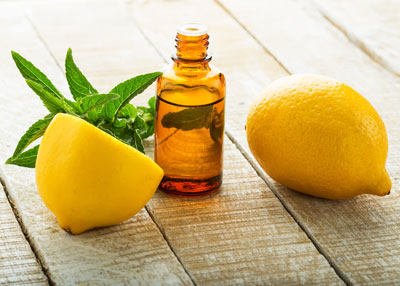
With hair loss
Lemon oil nourishes the roots, preventing hair loss. As a basis for this mask, oils rich in a complex of vitamins and minerals that strengthen the hair are well suited. After a month of regular application of the following composition, 2-3 times a week, the hair will noticeably grow stronger and will no longer remain on the comb.
Ingredients:
• 1 tablespoon of burdock oil;
• 1 tablespoon of castorca;
• 1 chicken egg yolk;
• 10 drops of lemon ether.
Mode of application:
1. Stir all ingredients.
2. Apply to the hair roots and over the entire length.
3. Wait 40 minutes.
4. Wash your hair in the usual way.
If the problem of hair loss is caused by any disease or disruption of the organs or systems, this mask will not help, and then you should consult a doctor.
To add shine
With regular use of a mask with lemon ether for 1-2 months, hair will gain shine and healthy appearance.
Ingredients:
• 1 tablespoon of avocado oil;
• 1 tablespoon coconut oil;
• 5 drops of lemon ether.
Mode of application:
1. Combine the ingredients.
2. Distribute over the entire length of the hair.
3. To sustain 1 hour.
4. Wash off with shampoo.
To accelerate the growth of curls
The following procedure stimulates blood flow to the hair roots, thereby accelerating their growth. It is recommended to make this mask 1-2 times a week for 3 months.
Ingredients:
• 10 grams of ground coffee;
• 20 ml of castorca (50 ml of kefir can be replaced);
• 10 drops of lemon oil.
Mode of application:
1. Brew coffee in 20 ml of water and cool.
2. Preheat castor oil in a water bath to 45 degrees and add to coffee.
3. Pour in lemon ether.
4. Vigorously rub into the skin of the head, and the remains distributed over the entire length of the hair.
5. Warm the shower cap and towel.
6. Keep the mask for 2 hours.
7. Wash off in the usual way.
To lighten the hair
Lemon is known for its whitening properties, and its ether, and even more so. Lightening the curls with a mask with such an ingredient, you not only do not damage the hair structure, but also provide appropriate care for your hair.
An incredible result, of course, is not to be expected, however, it is possible to make the hair a little lighter after several masks, which can be prepared in different variations.
Ingredients for mask number 1:
• 50 ml of water;
• 20 ml of hydrogen peroxide (3%);
• 10 drops of lemon oil.
Mode of application:
1. Mix all the ingredients.
2. For convenience, place the liquid in a spray bottle.
3. Spray the hair three times after drying each previous one.
4. After an hour, wash your hair in the usual way.
The following mask dries hair, so after the procedure it is recommended to apply a moisturizing balm. Use the mixture every other day to achieve the desired shade.
Ingredients for mask number 2:
• 150 ml of kefir;
• 20 grams of honey;
• 10 drops of lemon oil.
Mode of application:
1. Mix all ingredients.
2. Apply to hair for 2 hours.
3. Wash your hair as usual.
Ingredients for mask number 3:
• 2 tablespoons of sweet almond oil;
• 10–15 drops of lemon ether.
Mode of application:
1. Oils mix well.
2. Apply on strands for 30 minutes.
3. Wash off with shampoo.
Head massage
Massage the head with lemon essential oil before washing for at least 15 minutes. At the same time, 1-2 drops of the main component are dissolved in 1 tablespoon of base oil (for example, burdock, apricot or olive), which is preheated slightly in a water bath. The tips of the fingers are immersed in the prepared mixture and in circular, gently pressing movements massage the scalp.
Oil wraps
To improve the overall condition of the hair, it is recommended to do wraps twice a week for 1-2 months. This procedure will also reduce the occurrence of dandruff and seborrhea. To prepare the mixture, combine a few drops of lemon ether with oils suitable for head massage. Determine the quantity relative to the length of the hair: having done the procedure for the first time, you will understand how much to prepare the means for the next session. And for starters, take 2 tablespoons of base oil and 2–3 drops of essential lemon. The resulting mass is applied to clean, slightly damp hair from root to tip, wrap with food film, then a towel and incubated for 2 hours. To enhance the effect, you can leave the wrap overnight, but in this case it is better to replace the food film with a cotton scarf in order to avoid the greenhouse effect.
Aromatherapy
The procedure of aromatherapy is simple and does not take much time. Apply 2-3 drops of citrus ether on a wooden comb or brush with natural bristles and comb your hair, which is still wet after washing, for 10-15 minutes. Such sessions are best done 1-2 hours before bedtime. The procedure will make your hair smooth, shiny and silky, in addition, the pleasant aroma of lemon will help you relax before going to bed.
Useful tips on the use of lemon oil for hair
In addition to masks, lemon oil can be used in hair care in other ways that do not take much time, and with regular use will bring considerable benefits:
• adding ether to hair cosmetics. Lemon oil has the property of detoxification, so that when it is added to the shampoo, the cleansing of the hair and scalp occurs more intensely, and also the skin Ph is normalized. Put 1-2 drops of this ether into a single portion of shampoo, soap your head and hold the product on your hair for about a minute. A couple of droplets added to the balm, will provide hair with additional nutrition and saturation with vitamins;
• rinsing with citrus ether. The use of rinsing hair after washing with a decoction of medicinal herbs or mineral water is indisputable. And the effect will double if you enrich the healing liquid with 5-6 drops of the described oil. Lemon rinsing will give your hair density, shine and strengthen the roots. This procedure does not require rinsing.
It is recommended to add 2–3 drops of lemon oil to facial cleanser per 5 ml of base. In the tool for the body - 3-5 drops. And you should choose for different skin types certain base oil for the desired effect.
A selection of esters and base oils for different skin types
- Dry skin:
Base oil: peach, jojoba, wheat germ oil, avocado.
Ether: geranium, lavender, lemon, neroli, rose, ylang-ylang, marjoram, rosemary, dill.
- Oily skin:
Base oil: grape seed, almond, apricot, peach.
Ether: bergamot, cypress, juniper, lavender, lemon, rosemary, ylang-ylang.
- Normal skin:
Base oil: grape seed, almond, avocado, peach.
Ether: geranium, rose, lemon, neroli.
David Steinberg in his book "Preservatives in Cosmetics" (the original name of "Preservatives for Cosmetics" by David C. Steinberg, the work has not yet been translated into Russian) writes that oils of cumin, cinnamon, cloves, eucalyptus, lavender, lemon, rose, Rosemary, Sage, Sandalwood and Thyme have excellent antimicrobial properties. Unfortunately, the concentration required to adequately protect the product from the growth of bacteria, as a rule, exceeds the safe recommended rate for the use of essential oils in skin and hair care products.
This means that masks, creams and lotions made exclusively from natural ingredients (food, oils, etc.) are stored only in the refrigerator and not more than a day, as homemade cosmetics deteriorate quickly. It is advisable to prepare such tools immediately before use. Mixtures of oils prepared at home (for example, compositions for hands) are stored in dark glass bottles for no more than six months. It is believed that the storage time of purchased cosmetics is extended by half a year due to the additional properties of esters added to them, but the use of cosmetics after the expiration date is still not recommended for security reasons.
Lemon ester goes well with the following oils:
• benzoin;
• ylang-ylang;
• ginger;
• cardamom;
• incense;
• lime color;
• juniper;
• neroli;
• roses;
• chamomile;
• sandalwood;
• fennel;
• eucalyptus.
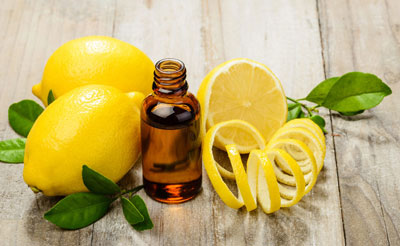
Lemon oil is used to create household laundry detergent, wet wipes, and even furniture polish.
Universal cleaner
Vinegar is an effective and environmentally friendly disinfectant, but not everyone likes its sharp, sour smell. In this case, lemon oil helps well. 2.5 tablespoons of liquid soap and 15–20 drops of ether are added to 2.5 cups of water. Means suitable for washing dishes and cleaning.
Washing powder
Home laundry detergent is easy to prepare and inexpensive. In addition, this detergent does not contain chemical and artificial substances, and therefore is completely biodegradable.
To make homemade powder, mix borax with soda ash (washing) and baking soda (take three glasses each), then add grated Castilian soap (2 bars) and 30 drops of lemon oil.
Polish
Lemon ether is well suited for polishing furniture. 15 drops of the concentrate are mixed with half a glass of olive and almond oils. The mixture gives shine to the tree and protects it from scratches and stains.
Wet Disinfectant Wipes
Reusable disinfecting wipes can be made from old T-shirts or an unnecessary piece of absorbent tissue. The fabric is cut into squares of convenient sizes, put in a sealed plastic container and impregnated with the following composition:
• 1.5 glasses of water;
• 1 tablespoon of coconut oil;
• 1 teaspoon of alcohol or vodka;
• 3 drops of lavender and lemon esters.
Air freshener
An air freshener is made of lemon oil, which will not only give the room a pleasant citrus scent, but also purify the air. A mixture of 25 drops of ether in a glass of water is filled with a spray bottle and used as needed.
Aromatherapy
It is believed that lemon oil sharpens the senses and is a symbol of love, material well-being, health, strength and wisdom. This air returns the body tone, creates a positive mood, helps to look at things with optimism and gives strength and vitality. When performing magical rituals, lemon oil was applied to amulets and talismans, since it was believed that it protects the wearer from harm and evil.
Using lemon oil to restore emotional balance
The second name for lemon oil is concentration oil. Citrus fragrance stimulates the mind and helps to concentrate, and also regulates emotional balance. In addition, it helps to focus on one lesson, gives clarity of mind and copes with confusion in thoughts. It is recommended to use schoolchildren and students, as their activity is associated with increased mental stress. Especially the ether is useful to those who have learning difficulties. Lemon helps to gain energy and determination to complete the job. He copes with anxiety, helps to adapt to the new situation and find a way out of a difficult situation. Attractive citrus scent fills with joy, helps in dealing with stress.
Lemon ester as an aphrodisiac
The ability of esters to positively influence sexual energy was known in antiquity. To set up a partner for a romantic setting, add a drop of lemon and two drops of rosewood, patchouli and ylang-ylang to the aroma lamp.
In order to have a noticeable effect of aroma, it is recommended to choose the most purified esters suitable for human consumption. They are recommended to buy in pharmacies. It is also important to correctly calculate the dose of oils: no more than 6 drops should be spent per 25 square meters of a room.
After each session, it is necessary to remove residual oils from the bowl with a piece of cotton dipped in alcohol.
Compositions to create a romantic atmosphere in the bedroom using aromalampy:
• 5 drops of ylang-ylang ether + 2 drops of geranium esters and cloves + 1 drop of lemon ether;
• 5 drops of rose ether + 3 drops of geranium ether + 2 drops of lemon ether;
• 3 drops of esters of ginger and patchouli + 2 drops of esters of geranium and lemon;
• 3 drops of esters of bergamot and lemon + 2 drops of esters of patchouli and sandalwood + 1 drop of rose ether.
Ways to use lemon ester for aromatherapy
Aromatherapy methods are striking in their diversity and versatility. To improve the psychological and physical well-being with the help of essential oils, aromaculons, aroma lamps and aroma massages are being actively used.
Aroma massage
Aromatic massage can be done with the help of many oils, but the absolute leaders are the ethers of orange and lemon. For the procedure at home, you can use such a popular composition:
• 20 ml jojoba oil;
• 10 ml of grape seed oil;
• 2 drops of vetiver and lemon ethers;
• 1 drop of geranium and juniper esters.
With the use of lemon ether as an additional component, erotic massages can be done. To increase a man’s sexual desire, add 30 ml of base oil and 3-4 drops of lemon, patchouli, ylang-ylang and cedar esters to the mixture. To sharpen the sensuality of both partners, add a drop of ylang-ylang concentrate and 4 drops of orange oil to the base.
Oil burner
Aroma lamp is a quick and convenient way to give the room a pleasant smell. Lemon ether is added to the base agent or water, and the bowl is filled with the mixture. Evaporating, the oil will fill the room with a pleasant aroma, help to cope with stress and clean the air from bacteria.
If you do not have an aroma lamp, you can make it yourself. To do this, you need to take a metal bowl or lid, attach the legs to it (to make a “table”), and install a candle for the whole structure. In the upper tank you need to pour the aromatic oil diluted with a basic agent or plain water.
Aromakulon (aromamedalyon)
Aromatherapy pendant is a miniature neck pendant made of stones, ceramics or bones in the form of a medallion or a vase with a small neck. Favorite ethers are added to it to maintain sexual energy and self-confidence. Lemon is well suited for this purpose, as the components of the oil have powerful energy properties. The best material for an aromatic pendant is clay, which retains its aroma for up to three weeks.
In the tank enough to pour three drops of any oil or oil mixture. Add ethers should be every three days. Wearing a pendant for the first time is recommended no longer than an hour (then the duration is increased to gradually get used to the new scent). When wearing the accessory regularly, it is necessary to wash it with a soda solution once every two weeks, and after drying it should be rinsed with a weak solution of vinegar.
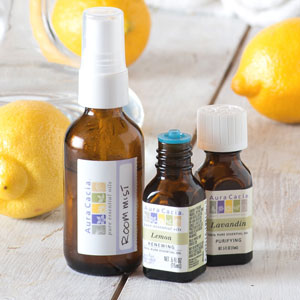
Lemon oil should not be used by people who are allergic to citrus fruits. Before use, it is strongly recommended to conduct checks on negative reactions for internal and external use.
Perform an olfactory allergy test:
1. Mix a drop of lemon ether with 5 drops of base oil.
2. Put a little mixture on a piece of paper or a piece of cotton.
3. Bring the remedy to the nose at a distance of 12–16 centimeters and take a deep breath several times.
4. If you do not have shortness of breath, bronchospasm and cough, then feel free to use the scent for aromatherapy and inhalation.
To test for a skin reaction, the oil mixture is prepared in the same manner as for the olfactory test. A small amount of the composition is applied to the area behind the ear, the inside of the elbow or the wrist. If a day does not show signs of allergy (redness, itching), then lemon oil can be used for baths, rubbing or applied to the skin as part of other cosmetics.
In case of malignant hypertension, increased pressure, post-stroke and severe mental conditions, it is strictly prohibited to take therapeutic baths.
Lemon oil consumed inside for medicinal purposes. Before that, you need to test for allergies. For this, a drop of lemon ether is added to a tablespoon of olive or sunflower oil, after which a drop of this mixture is poured into a teaspoon of jam. This “lemon” jam is consumed three times a day; on the following day, the sample is carried out with a double portion of the mixture of oils. You can use the tool inside, if during this time did not appear such signs of allergies, such as:
• rash on the skin;
• headache;
• choking;
• migraine;
• noise in ears;
• redness on the skin.
During pregnancy and lactation, it is not recommended to use lemon oil undiluted, and ether is contraindicated in hypotensive (people with low blood pressure). Since the product increases the susceptibility of the skin to ultraviolet, it is better not to carry out cosmetic procedures before walking in the sun. If it gets on mucous membranes, lemon oil causes irritation, so avoid contact of the product with the eyes and nose.
Terms of use of lemon oil for skin care
For application to the skin, use a small amount of lemon oil. Since the natural product is very concentrated, it can cause even more irritation, acne and redness if applied in a pure form. Therefore, lemon ester is always diluted with water or base oil.
Due to the fact that lemon essential oil is a highly concentrated product, it should be used with caution:
• Before first use, test for an allergic reaction. To do this, apply a drop of the product on the inner fold of the elbow and observe the reaction for a couple of hours: the absence of any reaction (redness, itching, irritation) indicates that the ether suits you;
• lemon oil is highly astringent and antiseptic, so you can not apply it on the scalp in its pure form;
• in addition, it is photosensitizing, therefore, it is not recommended to go out on a sunny day immediately after the procedure for the hair with its use;
• do not violate the duration of cosmetic procedures, because lemon has a whitening effect.
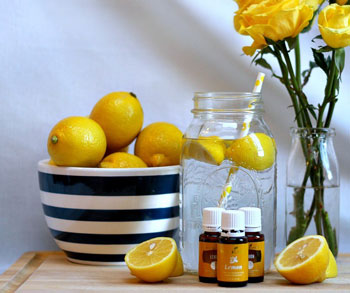
When creating this article was used material
from the following sources.
To the list of oilseeds of plant origin
We recommend that you look at the popular sections of the site myvaleology.com: MENU with a description of the sections | |||
| SOCIAL | DONATION | MY DIET | MY SPORT |


|
Release all4e8 |
||
Copyright © VZOJ 2023. All rights reserved. When reprinting or quoting myvaleology.com materials please put a link to the site myvaleology.com :
<a href="https://myvaleology.com">Healthy lifestyle</a>